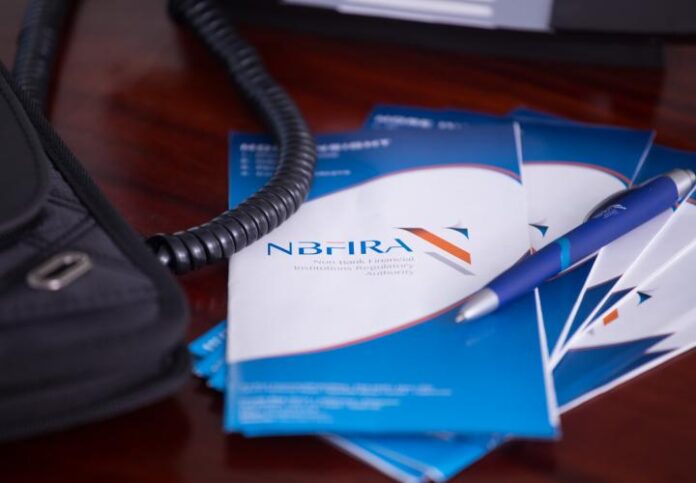The Non-Bank Financial Institution Regulatory Authority (NBFIRA) has fleshed out its plans to issue instructions to help non-bank financial institutions (NBFIs) comply with the Financial Intelligence (FI) Act.
According to NBIRA, the latest instructions are aimed at laying “out the procedure for identifying beneficial owners of legal entities and arrangements in line with the requirements of Section 20 of the FI Act.”
The section requires NBFIs to establish and verify the identity of beneficial owners when establishing a business relationship or carrying out a transaction with a customer. NBFIRA explained that a beneficial owner is an individual (natural person) who either directly or indirectly owns and/or controls a legal person or legal arrangement.
Among the financial institutions that are targeted by the instructions are those regulated by the NBFIRA the Insurance Industry, Retirement Funds organisations, those regulated by the Botswana Stock Exchange Act, those regulated by the Collective Investment Undertakings Act, the Securities Act and those regulated under the Virtual Assets Service Providers Act.
The instructions state that NBFI should establish a systematic procedure for verifying the identity of its customers including beneficial owners. It states that a NBFI should not establish a relationship or carry out any transactions with a prospective customer until the identity of that customer has been satisfactorily established and verified in accordance with the FI Act.
According to the instructions a NBFI should verify the identity of any individual who exercises ultimate effective control over a legal entity or legal arrangement and a NBFI should understand the nature of business, ownership and control structure of a legal entity and legal arrangement for purposes of establishing a customer risk profile.
“A NBFI should verify the identity of any person acting on behalf of a legal entity or legal arrangement. The identity of a customer, beneficial owner(s), as well as persons acting on their behalf, should be verified using credible sources,” the instructions say.
A NBFI should, on an on-going basis, conduct customer due diligence with respect to an existing business relationship which is subject to the requirements of customer identification and verification, including periodic review of customer information to ensure that it maintains current information and records relating to the customer and beneficial owner.
The instructions also indicate that “A NBFI should obtain and verify the identity of beneficial owner(s) of the following Nature; individual(s) who ultimately have a controlling ownership interest in a legal entity, whether by shares, voting property or other right; or where it is not possible to identify natural person(s).”
The instructions also indicate that a NBFI should obtain and verify the of beneficial owner(s) “who have control through ownership, or if there is doubt that those persons with the controlling ownership interest are the actual beneficial owners, then a NBFI should identify the individual(s) exercising control over the legal entity through other means, such as personal or financial influence.”
NBFIRA says examples of control by other means include personal connections to those owning or controlling a legal person, financing the legal entity, or contractual association; and where no natural persons are identified under (i) and (ii) above, a NBFI should identify and verify the relevant natural persons who are senior managing officers of the legal person.
It says Boards of directors [or most senior management in the absence of the former] of NBFIs are accountable and responsible for their entity’s compliance with provisions of the Financial Intelligence legislations including those on maintenance of beneficial ownership information.
“A NBFI that fails to comply with the requirements of Section 20(1)(b) of the FI Act by not establishing and verifying the identity of the beneficial owner shall be liable to a fine not exceeding P1 million,” NBFIRA says.
NBFIRA explained that legal persons and legal arrangements (often referred to as corporate vehicles) in their many different forms (i.e., companies, foundations, trusts, and partnerships have various legitimate roles as economic and social actors in the local and global community. “For example, the purpose of a trust may be to hold title to and manage property or assets for the benefit of a third party (i.e., future generations of a family), and as for companies and partnerships, their form and structures are often suitable for commercial transactions and economic activities thereby playing part in the development of economies.
Notwithstanding their licit purposes, NBFIRA says, legal persons and arrangements are increasingly misused for money laundering, terrorism financing, and proliferation financing (ML/TF/PF) through their complex ownership and control structures, activities, and transactions to disguise and conceal; (1) identities of their legal and beneficial owners, (2) their sources/destination of income and wealth and (3) their true purposes, for criminal reasons. These include but are not limited to tax evasion, fraud, corruption, bribery, and ML/TF/PF.
According to NBFIRA, availability and access to adequate, accurate and up-to-date beneficial ownership information is crucial for providing regulators and law enforcement agencies with leads to identify persons responsible for criminal activities hidden through corporate vehicle assets and transactions.



